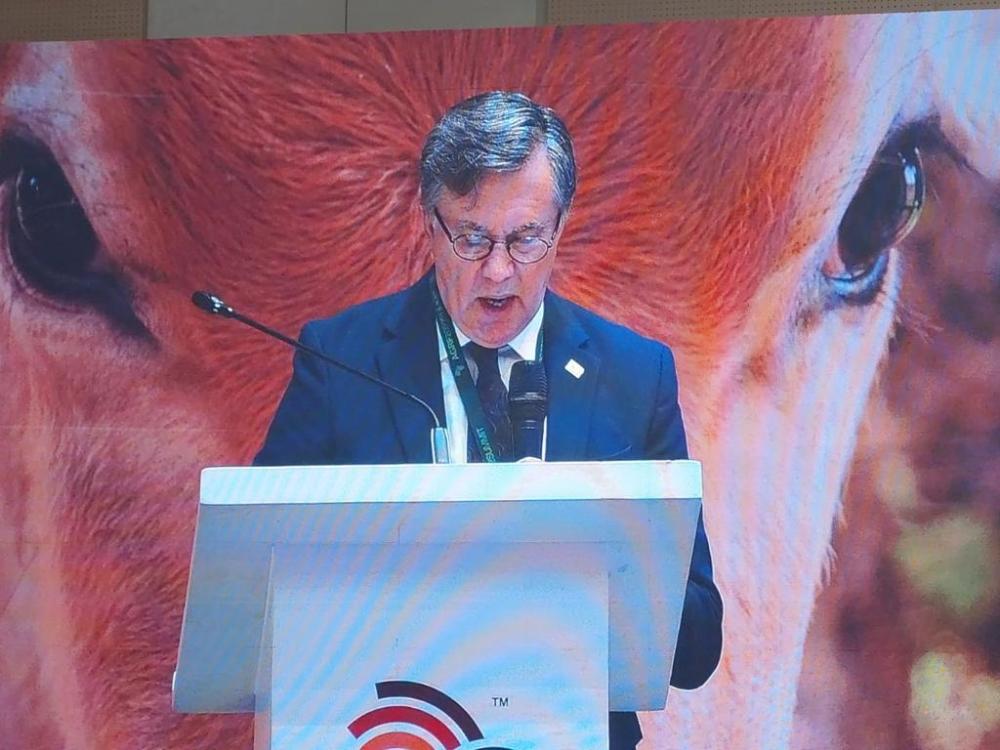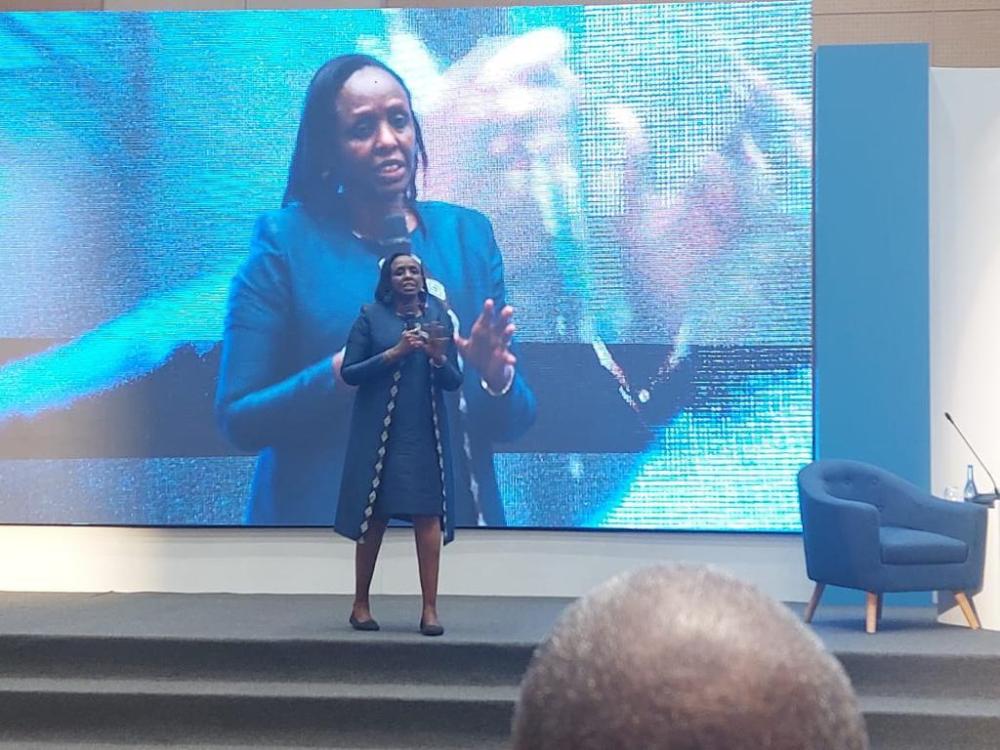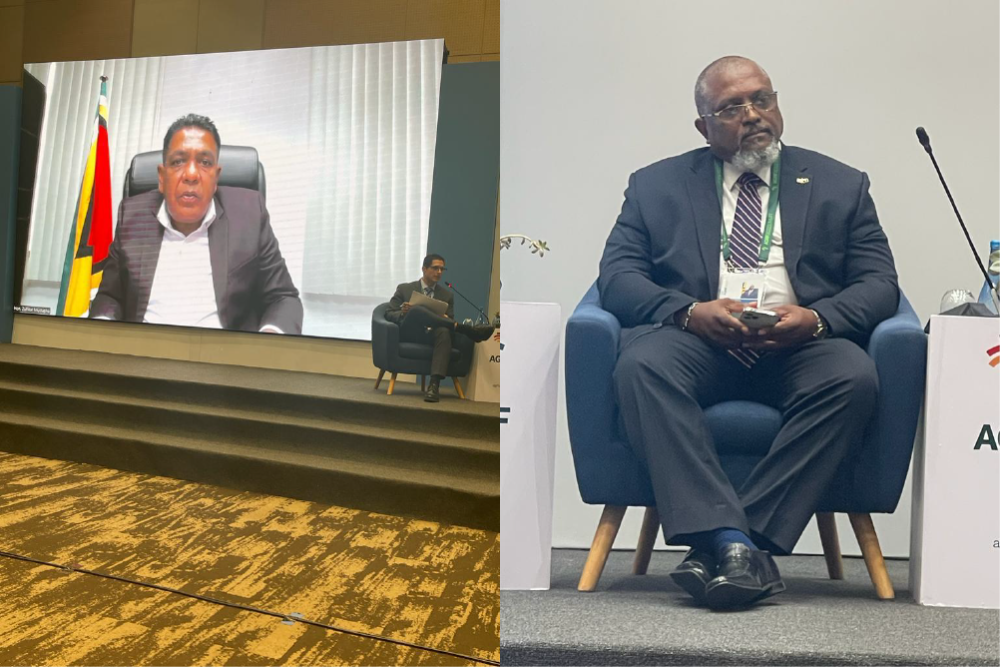IICA attends Rwanda forum that concludes that increased cooperation between Africa and the Americas will enhance the standard of living in their respective rural areas

Kigali, Rwanda, 12 September 2022 (IICA) – Africa and the Americas have established closer linkages to improve their agri-food system sustainability, with the attendance of the Inter-American Institute for Cooperation on Agriculture (IICA) at the annual African Green Revolution Forum (AGRF). The event is the major African forum focusing on the agriculture and food agenda.
The four-day meeting, which features discussions among leaders representing governments, international organizations, academia and the private sector from around the world, took place in Kigali, the capital of Rwanda.
South-South Cooperation—which is already charting a course for reciprocal cooperation and experience sharing between Latin America and the Caribbean and Africa, with some involvement from Asian countries—is critical in tackling the causes of food insecurity, malnutrition and environmental degradation in these regions and globally.
This was one of the main conclusions of the panel discussion, “South-South Cooperation: Leadership from the Americas and Asia”, which was staged at the Annual AGRF Summit. The discussion was jointly opened by Agnes Kalibata, President of the Alliance for a Green Revolution in Africa (AGRA) and the Special Envoy of the UN Secretary-General for the 2021 Food Systems Summit, along with the Director General of IICA, Manuel Otero.
Also participating in the discussion were the Minister of Agriculture and Food and Nutritional Security of Barbados, Indar Weir; the Minister of Agriculture and Rural Development of Mozambique, Olegario dos Anjos Banze; the Minister of Agriculture of Guyana, Zulfikar Mustapha; Special Advisor to the IICA Director General, Jorge Werthein; AGRA Regional Head for East Africa, Jean Jacques Muhinda; professor at the China Agricultural University, Shenggen Fan; Executive Director of the Syngenta Foundation, Simon Winter; and Director of Innovation at the Ministry of Agriculture, Livestock and Food Supply of Brazil, Sibelle de Andrade Silva.
The moderator was Javier Mateo Vega, of the Alliance of Bioversity International and the International Center for Tropical Agriculture (CIAT).
Protagonist regions

“The greater the crisis, the more cooperation is needed”, said Manuel Otero, in reference to the combined effects of climate change, the long-lasting economic and social effects of the COVID-19 pandemic and the increase in energy, food and fertilizer prices resulting from the war in Eastern Europe.
“Cooperation is action and is the result of our combined efforts. That is why we are here in Africa”, said the IICA Director General, who explained that: “Cooperation takes place between equals and that is what we are. That is the essence of South-South Cooperation and it is a concept in which we strongly believe, because it involves the building of bridges. Thus, we are prioritizing discussions between the Americas and Africa”.
Otero focused on commonalities between Africa and the Americas – the fact that together they account for 39% of the world’s forests, 51% of its carbon supplies, as well as a major share of its most valuable ecosystems, from an environmental and production perspective. He maintained that, “We are here to transform this potential into action, so that it will improve the standard of living of rural inhabitants”.
In closing, the Director General maintained that, “We must recognize that Africa and the Americas have a common past and present and a future to offer to the world. Thus, we are beginning discussions with African institutions. We must be realistic. The time to act is now. We cannot wait for the help of others, but must be the architects of this new era”.
Agnes Kalibata emphasized that South-South Cooperation has been taking place for some time; however, the world is at a particularly critical juncture at this time, which calls for closer engagement.
According to Kalibata, “Today, the question is: how do we move forward together? We already have a number of joint projects, from which African, Latin American and Caribbean countries are benefitting. My country, Rwanda has close ties with Brazil, a country that has taught us how agriculture can contribute to economic development. We must learn more about each other and as we do so, the more we will grow”.
Last July, AGRA, the institution led by Kalibata, jointly organized the “Africa-Americas Ministerial Summit on Agrifood Systems”, along with IICA and the African Union Development Agency-New Partnership for Africa's Development (AUDA-NEPAD). The Summit strengthened bioregional cooperation to tackle challenges related to food security and environmental sustainability.

Jean Jacques Muhinda presented a review of the material gains achieved in 2022, in terms of cooperation between the Americas and Africa, and highlighted the importance of scientific and technological knowledge exchange to increase agricultural sustainability and resilience.
Muhinda also spoke of the need to increase food trade between both regions. “Our potential for mutual cooperation is endless”, he said.
Minister of Agriculture of Barbados, Indar Weir, spoke of the vulnerability of the Caribbean to climate change—a situation that is mirrored in various African countries—and highlighted the value of IICA’s technical cooperation efforts to build resilience.
Weir remarked that, “We must recognize that we are facing a challenge of immense proportions that we cannot tackle alone. Barbados is a small island state that lacks the financial resources to make the required investments to adequately tackle the hurricanes and flooding that affect our food production”.
Zulfikar Mustapha, Minister of Agriculture of Guyana, who was participating virtually from Georgetown, felt that the countries of the Global South should appreciate their common challenges. He said that, “We need to establish partnerships that will allow us to spur industrialization and to add value to our raw materials”.
On the other hand, Jorge Werthein recalled that the closer engagement between the two regions began to take shape when Agnes Kalibata invited IICA to join the Summit Champions Network, one of the structures created to prepare for and support the 2021 UN Food Systems Summit.
He stated that, “When we began to work together we recognized that the agriculture sectors in Africa and Latin America and the Caribbean have many common problems. We are confident that greater cooperation will improve the standard of living of these societies and the competitiveness of the agriculture sector”.
Finally, Werthein maintained that, “The two regions must cooperate to adapt to climate change and also stand to play a fundamental role in mitigation. Agriculture in Africa and in the Americas is part of the solution and not the problem”.
More information:
Institutional Communication Division
comunicacion.institucional@iica.int